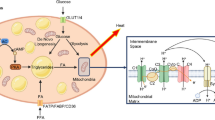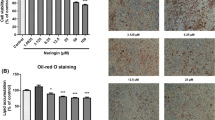Abstract
Heat stress (HS) results in health problems in animals. This study was conducted to investigate the effect and the underlying mechanism of HS on the proliferation and differentiation process of 3T3-L1 preadipocytes. 3T3-L1 preadipocytes were treated at 37 °C or 41.5 °C. HS up-regulated the mRNA and protein expression level of heat shock protein 70 (HSP70). Furthermore, the proliferation of 3T3-L1 preadipocytes were significantly inhibited after HS treatment for 2 days. A large number of accumulated lipid droplets were observed under the microscope after HS treatment for 8 days. Notably, the result of oil red O staining showed that the number of lipid droplets increased significantly and the differentiation ability of the cells was enhanced after HS. Moreover, after 2 and 8 d of differentiation, HS increased the transcription levels of fat synthesis genes including peroxisome proliferators activated receptor γ (PPARγ), fatty acid binding protein 2 (AP2), fatty acid synthase (FAS) and CCAAT enhancer binding protein α (CEBPα) genes, while decreasing the transcription levels of lipid decomposition genes including ATGL and HSL genes. In addition, HS reduced the expression of AMPK and PGC-1α, as well as the dephosphorylation of AMPK. 5-Aminoimidazole-4-carboxamide ribonucleotide (AICAR) can eliminate HS induced lipogenesis by activating AMPK. These results indicated that HS inhibited the proliferation of 3T3-L1 preadipocytes and promoted lipid accumulation by inhibiting the AMPK-PGC-1α signaling pathway in 3T3-L1 preadipocytes. This work lays a theoretical foundation for improving the effect of HS on meat quality of livestock and provides a new direction for the prevention of obesity caused by HS.









Similar content being viewed by others
References
Awwad O, Coperchini F, Pignatti P, Denegri M, Massara S, Croce L, di Buduo CA, Abbonante V, Balduini A, Chiovato L, Rotondi M (2018) The AMPK-activator AICAR in thyroid cancer: effects on CXCL8 secretion and on CXCL8-induced neoplastic cell migration. J Endocrinol Investig 41:1275–1282. https://doi.org/10.1007/s40618-018-0862-8
Beere HM, Wolf BB, Cain K, Mosser DD, Mahboubi A, Kuwana T, Tailor P, Morimoto RI, Cohen GM, Green DR (2000) Heat-shock protein 70 inhibits apoptosis by preventing recruitment of procaspase-9 to the Apaf-1 apoptosome. Nat Cell Biol 2:469–475. https://doi.org/10.1038/35019501
Bernabucci U, Basiricò L, Morera P, Lacetera N, Ronchi B, Nardone A (2009) Heat shock modulates adipokines expression in 3 T3-L1 adipocytes. J Mol Endocrinol 42:139–147. https://doi.org/10.1677/JME-08-0068
Bertile F, Raclot T (2011) ATGL and HSL are not coordinately regulated in response to fuel partitioning in fasted rats. J Nutr Biochem 22:372–379. https://doi.org/10.1016/j.jnutbio.2010.03.005
Bharati J, Dangi SS, Chouhan VS, Mishra SR, Bharti MK, Verma V, Shankar O, Yadav VP, Das K, Paul A, Bag S, Maurya VP, Singh G, Kumar P, Sarkar M (2017) Expression dynamics of HSP70 during chronic heat stress in Tharparkar cattle. Int J Biometeorol 61:1017–1027. https://doi.org/10.1007/s00484-016-1281-1
Bu S, Yuan CY, Xue Q, Chen Y, Cao FL (2019) Bilobalide Suppresses Adipogenesis in 3 T3-L1 Adipocytes via the AMPK Signaling Pathway. Molecules 24:3503. https://doi.org/10.3390/molecules24193503
Chau MD, Gao J, Yang Q, Wu Z, Gromada J (2010) Fibroblast growth factor 21 regulates energy metabolism by activating the AMPK-SIRT1- PGC-1α pathway. Proc Natl Acad Sci U S A 107:12553–12558. https://doi.org/10.1073/pnas.1006962107
Chen B, Feder ME, Kang L (2018) Evolution of heat-shock protein expression underlying adaptive responses to environmental stress. Mol Ecol 27:3040–3054. https://doi.org/10.1111/mec.14769
Coughlan KA, Valentine RJ, Ruderman NB, Saha AK (2013) Nutrient excess in AMPK downregulation and insulin resistance. J Endocrinol Diabetes Obes 1:1008
Dewey WC, Westra A, Miller HH, Nagasawa H (1971) Heat-induced lethality and chromosomal damage in synchronized chinese hamster cells treated with 5-bromodeoxyuridine. Int J Radiat Biol Relat Stud Phys Chem Med 20:505–520. https://doi.org/10.1080/09553007114551421
Ezure T, Amano S (2009) Heat stimulation reduces early adipogenesis in 3T3-L1 preadipocytes. Endocrine 35:402–408. https://doi.org/10.1007/s12020-009-9164-4
Feder ME, Hofmann GE (1999) Heat-shock proteins, molecular chaperones, and the stress response: evolutionary and ecological physiology. Annu Rev Physiol 61:243–282. https://doi.org/10.1146/annurev.physiol.61.1.243
Gaidhu MP, Anthony NM, Patel P, Hawke TJ, Ceddia RB (2010) Dysregulation of lipolysis and lipid metabolism in visceral and subcutaneous adipocytes by high-fat diet: Role of ATGL, HSL, and AMPK. Am J Phys 298:C961–C971. https://doi.org/10.1152/ajpcell.00547.2009
Han MH, Kim HJ, Jeong JW, Park C, Choi YH (2018) Inhibition of adipocyte differentiation by anthocyanins isolated from the fruit of vitis coignetiae pulliat is associated with the activation of ampk signaling pathway. Toxicol Res 34:13–21. https://doi.org/10.5487/TR.2018.34.1.013
Horowitz M, Maloyan A, Shlaier J (1997) HSP70 kDa dynamics in animals undergoing heat stress superimposed on heat acclimation. Ann NY Acad Sci 813:617–619. https://doi.org/10.1111/j.1749-6632.1997.tb51755.x
Jang BC (2016) Artesunate inhibits adipogeneis in 3 T3-L1 preadipocytes by reducing the expression and/or phosphorylation levels of C/EBP-α, PPAR-γ, FAS, perilipin A, and STAT-3. Biochem Biophys Res Commun 474:220–225. https://doi.org/10.1016/j.bbrc.2016.04.109
Katsumata M, Yano H, Ishida N, Miyazaki A (1990) Influence of a high ambient temperature and administration of clenbuterol on body composition in rats. J Nutr Sci Vitaminol 36:569–578. https://doi.org/10.3177/jnsv.36.569
Kellner TA, Baumgard LH, Prusa KJ, Gabler NK, Patience JF (2016) Does heat stress alter the pig's response to dietary fat? J Anim Sci 94:4688–4703. https://doi.org/10.2527/jas.2016-0756
Kodiha M, Rassi JG, Brown CM, Stochaj U (2007) Localization of AMP kinase is regulated by stress, cell density, and signaling through the MEK→ ERK1/2 pathway. Am J Physiol 293:C1427–C1436. https://doi.org/10.1152/ajpcell.00176.2007
Li M, Li D, Xiong T, Nan X, Wang G (2019) Nutritional strategies for alleviating the detrimental effects of heat stress in dairy cows: a review. Int J Biometeorol 63:1283–1302. https://doi.org/10.1007/s00484-019-01744-8
Liu CT, Brooks GA (2012) Mild heat stress induces mitochondrial biogenesis in C2C12 myotubes. J Appl Physiol 112:354–361. https://doi.org/10.1152/japplphysiol.00989.2011
Liu H, Wang J, Liu M, Zhao H, Yaqoob S, Zheng M, Cai D, Liu J (2018) Antiobesity Effects of Ginsenoside Rg1 on 3 T3-L1 Preadipocytes and high fat diet-induced obese mice mediated by AMPK. Nutrients 10:830. https://doi.org/10.3390/nu10070830
Mackey MA, Zhang XF, Hunt CR, Sullivan SJ, Blum J, Laszlo A, Roti Roti JL (1996) Uncoupling of M-phase kinase activation from the completion of S-phase by heat shock. Cancer Res 56:1770–1774
Mansour M (2014) The roles of peroxisome proliferator-activated receptors in the metabolic syndrome. Prog Mol Biol Transl Sci 121:217–266. https://doi.org/10.1016/B978-0-12-800101-1.00007-7
Merrill GF, Kurth EJ, Hardie DG, Winder WW (1997) AICA riboside increases AMP-activated protein kinase, fatty acid oxidation, and glucose uptake in rat muscle. Am J Physiol 273:E1107–E1112. https://doi.org/10.1152/ajpendo.1997.273.6.E1107
Miller SG, de Vos P, Guerre-Millo M, Wong K, Hermann T, Staels B, Briggs MR, Auwerx J (1996) The adipocyte specific transcription factor C/EBPalpha modulates human ob gene expression. Proc Natl Acad Sci U S A 93:5507–5511. https://doi.org/10.1073/pnas.93.11.5507
Min L, Cheng JB, Shi BL, Yang HJ, Zheng N, Wang JQ (2015) Effects of heat stress on serum insulin, adipokines, AMP-activated protein kinase, and heat shock signal molecules in dairy cows. J Zhejiang Univ Sci B:541-548. https://doi.org/10.1631/jzus.B1400341
Nie QH, Fang MX, Xie L, Shen X, Liu J, Luo ZP, Shi JJ, Zhang XQ (2010) Associations of ATGL gene polymorphisms with chicken growth and fat traits. J Appl Genet 51:185–191. https://doi.org/10.1007/BF03195726
Ohashi K, Burkart V, Flohe S, Kolb H (2000) Cutting edge: heat shock protein 60 is a putative endogenous ligand of the toll-like receptor-4 complex. J Immunol 164:558–561. https://doi.org/10.4049/jimmunol.164.2.558
Park HG, Han SI, Oh SY, Kang HS (2005) Cellular responses to mild heat stress. Cell Mol Life Sci 62:10–23. https://doi.org/10.1007/s00018-004-4208-7
Purohit GK, Mahanty A, Suar M, Sharma AP, Mohanty S (2015) Investigating hsp gene expression in liver of channa striatus under heat stress for understanding the upper thermal acclimation. Biomed Res Int 2014:1–10. https://doi.org/10.1155/2014/381719
Qu H, Donkin SS, Ajuwon KM (2015) Heat stress enhances adipogenic differentiation of subcutaneous fat depot-derived porcine stromovascular cells. J Anim Sci 93:3832–3842. https://doi.org/10.2527/jas.2015-9074
Qu H, Yan H, Lu H, Donkin SS, Ajuwon KM (2016) Heat stress in pigs is accompanied by adipose tissue-specific responses that favor increased triglyceride storage. J Anim Sci 94:1884–1896. https://doi.org/10.2527/jas.2015-0084
Raaphorst GP, Dewey ML, Freemanw C (1979) Radiosensitivity and recovery from radiation damage in cultured cho cells exposed to hyperthermia at 42.5 or 45.5 °C. RADIATION RES 79:390–402
Rao Y, Liu H, Gao L, Yu H, Tan JH, Ou TM, Huang SL, Gu LQ, Ye JM, Huang ZS (2015) Discovery of natural alkaloid bouchardatine as a novel inhibitor of adipogenesis/lipogenesis in 3 T3-L1 adipocytes. Biorg Med Chem 23:4719–4727. https://doi.org/10.1016/j.bmc.2015.05.057
Sanders SR, Cole LC, Flann KL, Baumgard LH, Rhoads RP (2009) Effects of acute heat stress on skeletal muscle gene expression associated with energy metabolism in rats. FASEB J 23. doi:https://doi.org/10.1096/fasebj.23.1_supplement.598.7
Sapareto SA, Hopwood LE, Dewey WC, Raju MR, Gray JW (1978) Effects of hyperthermia on survival and progression of Chinese hamster ovary cells. Cancer Res 38:393–400
Schnyder S, Handschin C (2015) Skeletal muscle as an endocrine organ: PGC-1α, myokines and exercise. Bone 80:115–125. https://doi.org/10.1016/j.bone.2015.02.008
Small CA, Garton AJ, Yeaman SJ (1989) The presence and role of hormone-sensitive lipase in heart muscle. Biochem J 258:67–72. https://doi.org/10.1042/bj2580067
Stein SC, Woods A, Jones NA, Davison MD, Carling D (2000) The regulation of AMP-activated protein kinase by phosphorylation. Biochem J 345(Pt 3):437–443
Takano H, Komuro I (2009) Peroxisome proliferator-activated receptor γ and cardiovascular diseases. Circ J 73:214–220. https://doi.org/10.1253/circj.cj-08-1071
Thomson DM (2018) The role of AMPK in the regulation of skeletal muscle size, hypertrophy, and regeneration. Int J Mol Sci 19. https://doi.org/10.3390/ijms19103125
Urano D (1988) Thermal effects on cells and tissues. VSP,
Victoria SFM et al (2015) Effects of heat stress on carbohydrate and lipid metabolism in growing pigs. Phys Rep 3:e12315. https://doi.org/10.14814/phy2.12315
Wang T, Yu QJ, Chen JA, Deng B, Qian LH, Le YY (2010) PP2A Mediated AMPK Inhibition Promotes HSP70 Expression in Heat Shock Response. PLoS One 5:e13096. https://doi.org/10.1371/journal.pone.0013096
Wang Y, Wu Z, Li D, Wang D, Wang X, Feng X, Xia M (2011) Involvement of oxygen-regulated protein 150 in AMP-activated protein kinase-mediated alleviation of lipid-induced endoplasmic reticulum stress. J Biol Chem 286:11119–11131. https://doi.org/10.1074/jbc.M110.203323
Wood JD et al (2008) Fat deposition, fatty acid composition and meat quality: A review. Meat Sci 78:343–358. https://doi.org/10.1016/j.meatsci.2007.07.019
Xie J, Tang L, Lu L, Zhang L, Xi L, Liu HC, Odle J, Luo X (2014) Differential expression of heat shock transcription factors and heat shock proteins after acute and chronic heat stress in laying chickens (Gallus gallus). PLoS One 9:e102204. https://doi.org/10.1371/journal.pone.0102204
Xue B, Song J, Liu L, Luo J, Tian G, Yang Y (2017) Effect of epigallocatechin gallate on growth performance and antioxidant capacity in heat-stressed broilers. Arch Anim Nutr 71:362–372. https://doi.org/10.1080/1745039X.2017.1355129
Yan J, Bao E, Yu J (2009) Heat shock protein 60 expression in heart, liver and kidney of broilers exposed to high temperature. Res Vet Sci 86:533–538. https://doi.org/10.1016/j.rvsc.2008.09.002
Zeni O, Simkó M, Scarfi M, Mattsson M (2017) Cellular response to elf-mf and heat: evidence for a common involvement of heat shock proteins? Front Public Health 5:280. https://doi.org/10.3389/fpubh.2017.00280
Zhang L, Huang Y, Liu F, Zhang F, Ding W (2016) Vanadium(IV)-chlorodipicolinate inhibits 3T3-L1 preadipocyte adipogenesis by activating LKB1/AMPK signaling pathway. J Inorg Biochem 162:1–8. https://doi.org/10.1016/j.jinorgbio.2016.06.013
Acknowledgments
This work was supported by the grants from National Natural Science Foundation of China (31760672 and 31460606).
Ethics statement
All experimental procedures were approved by the Institutional Animal Care and Welfare Committee of Guangxi University (Nanning, China).
Author information
Authors and Affiliations
Corresponding author
Ethics declarations
Competing interests
The authors have no competing interests to declare.
Additional information
Publisher’s note
Springer Nature remains neutral with regard to jurisdictional claims in published maps and institutional affiliations.
Rights and permissions
About this article
Cite this article
Huang, Y., Xie, H., Pan, P. et al. Heat stress promotes lipid accumulation by inhibiting the AMPK-PGC-1α signaling pathway in 3T3-L1 preadipocytes. Cell Stress and Chaperones 26, 563–574 (2021). https://doi.org/10.1007/s12192-021-01201-9
Received:
Revised:
Accepted:
Published:
Issue Date:
DOI: https://doi.org/10.1007/s12192-021-01201-9




